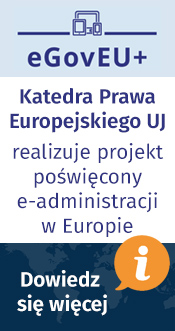The Current developments of ECJ case law
We cordially invite you to a course entitled „The Current developments of ECJ case law” given in English by Dr. Bartłomiej Kurcz from the European Commission.
For whom?
- Students of all years and PhD students who speak English or want to improve their speaking skills. Especially for those who want to learn more about the functioning of the European Union and prepare for various types of moot courts
What does the course offer?
- • teaches independent thinking, drawing conclusions and the art of argumentation
- • improves public speaking skills
- • improves knowledge of the English language • prepares for participation in moot courts
- • increases the practical knowledge about the functioning of the European Union and its institutions
- • increases knowledge of the case law of the Court of Justice of the European Union
- • increases the possibility of contacts with ERASMUS students from other countries
Who is the lecturer ?
- Dr Bartłomiej Kurcz is an official of the European Commission with many years of experience. He was responsible for the preparation of many EU projects, including company law reform. He has lectured at many foreign universities.
What do participants say about the course?
Karol Stańdo, PhD student: Classes on Current Developments of ECJ Case-law are an opportunity to gain practical knowledge about appearing before the CJEU and the consequences of its decisions for national law.
Dr Bartłomiej Kurcz has extensive experience and knowledge about the functioning of EU institutions. Moreover, the form of the moot court means that we can also compete with other students and learn about each case and the vocabulary used by the Court in Luxembourg in detail, without reading the judgments for many hours.
Finally, getting to know the current trends in the CJEU jurisprudence and the experiences of students from other EU countries is a great help in a later legal career. It allows applying the CJEU judgments in practice, and friendships made during classes pay off in cross-border cases. All of this in the relaxed atmosphere of the classes and frequent meetings of students after their end.

